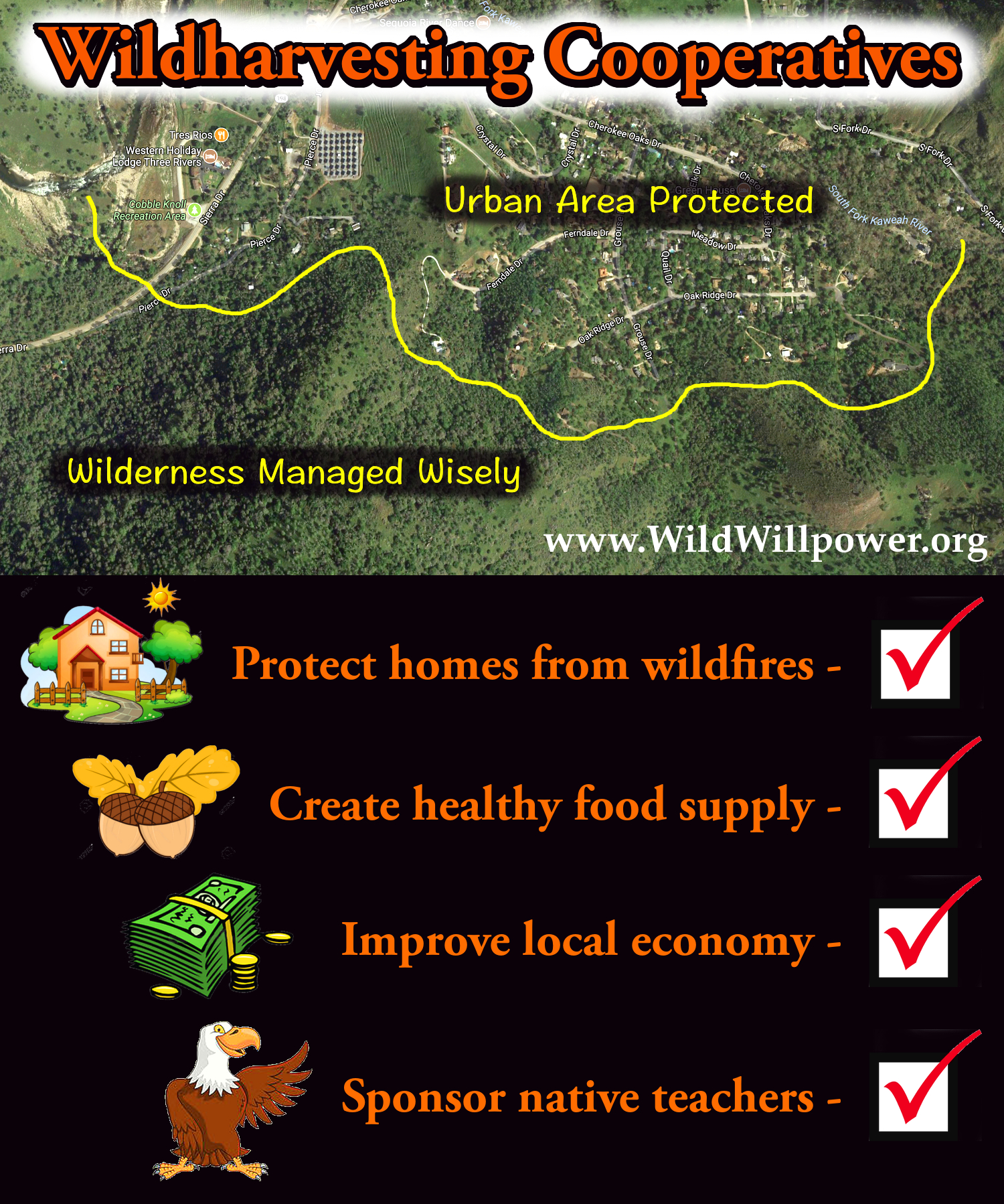Important Update:
Unfortunately Kern River Wildharvesting Cooperative was robbed in 2016 and we have yet to recover from our losses. To lower our expenses content from www.KernRiverCoop.com has been transferred to this page. We hope to open in the future.
******************************
Kern River Wildharvesting Cooperative (Kern River Co-op) is located near Lake Isabella, California along The Pacific Crest Trail — where the majestic Sequoia National Forest merges with the high Mojave Desert. As the first “wildharvesting cooperative” in the country, we have an important business plan that:
1.) protects infrastructure from wildfires and helps prevent them;
2.) benefits and restores the health of native ecosystems;
3.) provides a strong, local, production-based economy.
One of the most important products we offer is acorn flour— excellent for making bread, muffins, pancakes, and more! Oak trees produce a whopping 4.5 tons of nuts per acre. They’re quite a lucrative tree!
Acorn Bread = Very Tasty:
Wildfire Prevention, Resource Production:
By employing management techniques used by California native tribes for hundreds of years, our work prevents wildfires. Deadwood is cleared from the forest floor for use in shelter building and for building safe fires for cooking. We often camp on-site in the areas where we gather, and beautiful shelters and efficient fire pits are often left behind by our crew for use in recreational camping by others. Because we use old-world techniques historically employed by tribes, the earthy structures fit right into the ecosystem and they help clear a lot of deadwood! Here’s a photo of one of our nearly-completed shelters:
Wildfires are also prevented by the way we manage oak trees. Dried underbrush is raked into small circles and safely control burned in order to:
1.) replenish topsoil;
2.) remove the fire hazard imposed by dried leaves from wilderness understory;
3.) make harvesting acorns easier.
How and why California tribes performed this same practice every year is explained in the following excerpt from the book Tending the Wild; Native American Knowledge and the Management of California’s Natural Resources by M. Kat Anderson:
“Fire was the primary land management tool of California Indians because it had many significant ecological effects.
1. Decreasing Detritus and Recycling Nutrients – many wild plant populations accumulate aging parts (dead branches and shoots, leaves, cones, and seed pods) that may reduce plant vigor and productivity over time. Fires set by California Indians consumed this biomass and released some of the plant nutrients it contained. Scientific studies have recently shown that nutrient movement can take a long time, relative to human life spans. The turnover rates of many nutrients are slow. In some ecosystems the nutrient storage compartment (e.g., the litter on the forest floor) can become a vault, locked against internal cycling. Various ecosystems will not remain productive over time if dead material accumulates much faster than it decomposes. Like soil. arthropods, bacteria, and fungi, fire is a mineralizing agent in forests and other vegetation types, but it works much faster than decaying organisms and thus speeds up nutrient recycling and
the return of sites to high productivity. Although fire can accelerate nitrification and thus loss of nutrients, research is demonstrating that the leguminous, nitrogen-fixing forbs (such as lupines and clovers) often promoted by fire can rapidly provide nutrient replacement.
2. Controlling Insects and Pathogens – fire helped to control the pathogens and insects that would otherwise compete for the same resources used by native people. Many Indian tribes in California burned in Oak (Quercus spp.) woodlands and Tan Oak (Lithocarpus densiflorus) stands to reduce insect pests that inhabit acorns and over winter the Oak leaf duff. According to Kathy Heffner (Wilaki, pers. comm. 1992), all of the tribes she interviewed in Northern California (Hupa, Hailaki, Tolowa, Yurok, & Karuk) burned under the California Black Oaks and other oak species to destroy insect pests: “They needed to eliminate that duff that was underneath the Oak trees because the oaks will drop their leaves & create a big pile of duff. As long as all that duff stayed there, when the acorns dropped, the acorns could only be on the ground just a little while because that duff was home to a lot of bugs. The minute they hit the ground, those bugs were into those acorns. So if they burned it, that eliminated the duff and the insects that would get into the acorns.”
In a 1916 letter to the California Fish & Game Commission, Klamath River jack from Del Norte County makes the link between eliminating wormy acorns and setting fires: “Fire burn up old acorn that fall on ground. old acorn on ground have lots worm; no burn old acorn, no burn old bark, old leaves, bugs and worms come more every year… Indian burn every year just same, so keep all ground clean, no bark, no dead leaf, no old wood on ground, no old wood on brush, so no bug can stay to eat leaf and no worm can stay to eat berry and acorn. Not much on ground to make hot fire so never hurt big trees, where fire burn.”
Arthropods in two major genera feed on acorns during their larval stage, causing severe damage or destruction. These are the filbert worm (Cydia
latiferreana) and the filbert weevils (Curculio occidentalis, C. pardus, & C. aurvestis). Studies of California Oak species have shown that individual trees can exhibit up to 80% acorn damage by the filbert worm and 20 percent to 75% destruction by filbert weevils. Individual trees can exhibit up to 95% acorn damage from a combination of these pests. The larvae tunnel throughout the inside of the acorn, leaving frass, destroying the embryo, and rendering the acorn inedible.
Ted Swiecki, a plant pathologist who has studied California oak pests and diseases, on the habits, feeding, and life cycles of the filbert worm and filbert weevil: ‘These insects invade acorns while on the tree, and the insects continue to develop as the acorns fall. In fact, insect-infested and diseased acorns tend to drop earlier than sound acorns. Eventually, the larvae exit the acorn and over winter as pupae in the duff beneath oak trees. If you were to burn off the duff and old acorns in the fall, you would destroy most if not all of the infested acorns as well as pupae that are in the duff. This would greatly reduce the number of filbert worm and filbert weevil adults that emerge in the following year, which would reduce the level of infestation in the acorn crop. If you were to do this every year, or even every couple of years, I would think that you would end up with a pretty clean crop of acorns, with relatively low losses due to insects. Also, burning of plant debris beneath the trees would make harvesting easier whether you are knocking acorns out of the tree or simply waiting for them to fall. It makes the acorns easier to find and pick up and eliminates an old acorns (with holes in them) that would need to be sorted out.’”
Kern River Wildharvesting Cooperatives use the aforementioned knowledge along the outskirts of urban areas in order to create fuel-free zones which protect infrastructure from incoming wildfires. Valuable resources are produced and protected.
Click to Enlarge:
Some Products Include:
- Caution! Although poisonous when eaten raw due to the chemical aesculin present throughout the tree, buckeye nuts may be quickly and efficiently processed into flour for use in bread making, etc.
- Buckeye trees produce 4.4 tons of nuts per acre!
- Much larger than most nuts currently sold on the U.S. market.
- Nuts currently shipped in from China and Russia for U.S. markets even though they grow coast-to-coast throughout the U.S.
- Nuts edible raw or toasted, and can be pressed for oil.
Nuts:
Pollen:
- The pollen from the catkins is high is 30% its weight in protein & contains a wide variety of minerals & nutrients.
3.) Red Desert Rice aka Indian Rice Grass
Rice that doesn’t require boatloads of water to grow!?!?! Its a “save the world food”!!!
- high in protein, omega-3, and antioxidants.
- grows in ~7 states!
- Golden Chia Seeds are currently not available in stores: Black Chia Seeds {Salvia hispanica} are imported from South America.
Richard Lonewolf on Golden Chia Seeds:
5.) Sycamore Syrup
- similar to maple syrup, but tastes more like butterscotch or honey.
Products & Services We Plan to Offer:
-
Wildharvested Goods
-
Bulk Section Native Foods, Herbal Medicine, & Highly-Efficient Backpacking Food
-
Heirloom Homesteading Starter Kits
-
Professionally-Endorsed Outdoor & Survival Gear
-
Educational Materials
-
& more!
Our Commitments:
-
Coordinate Respectfully with Forest Officials.
-
Uphold “The Zero-Trash Commitment”.
-
Use “Eco-Wise Wildfire Prevention Techniques”
-
Use Positive-Impact Harvesting Techniques Whenever Harvesting.










